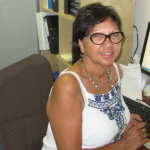Alma is one of Australia’s only Indigenous Relay Interpreters. Alma provides relay services to hearing impaired Aboriginal and Torres Strait Islanders across Cape York and Far North Queensland.
My father Thomas Waia (dec.) is from Saibai Island and my mother Ruth Waia nee Reid (dec.) is from Woorabinda.
I was born in Cairns and actually was born with perfect hearing. But at the age of 3, we realised something was wrong.
I remember playing with my dolls and I couldn’t hear my sister calling out to me. I couldn’t hear her. That’s when my family took me to see a Doctor who wanted to do surgery but as it was still unknown re: success rate. Mum and Dad chose not to. Since then, I haven’t been able to hear.
Mum told our island family that I couldn’t hear anymore and the family accepted it and took it in their stride. They all just started picking up communicating with me in Island sign language. We started with basic sign language that mirrored the action (like lowering hands to indicate to take a seat) and this meant that it was easy for us to all communicate within the family. In the early years it was mainly Island sign language and then later it was a variation of Auslan and Islander sign language, and the family just picked it up didn’t even think twice about it – we all just accepted it and got on with life.
It’s actually very interesting that Aboriginal and Torres Strait Islander communities have different sign languages. Although Islanders all have their own unique sign languages, I’m able to sit with different communities and quickly integrate and understand their language to enable them to be translated. It’s a unique skill and I’m one of very few people in Australia who can do this.
When I was seven years old, a white man came to my place to meet my mother. I was really scared as I thought that this man wanted to take me away. But then he sat down and began speaking with my mother and I thought they were going to take me from her! But after that meeting, I found out that they were actually arranging for me to attend a special unit at Cairns West State School. This was my first time meeting other hearing impaired kids, and it was an eye opening experience. I couldn’t understand as they were signing in Auslan so after years of learning Island sign language, I had the challenge of starting over and learning Auslan. Although this was a challenge, I took what I learned at school back home and would teach my family as well.
When I went to Cairns High School, I still hadn’t got the grasp of Auslan, so this made my time there quite difficult. I actually finished High School in Rockhampton and was the only deaf student at the school!
How does Relay Interpretation work?
There’s a translator who communicates to me in Auslan, which I then in turn translate into an Aboriginal or Islander sign language for whoever I am helping. I can then translate their answers into Auslan for courts, hospitals, or anyone else that needs to communicate.
Why become a Relay Interpreter?
I just feel like I have to help. I feel a strong connection with the people that I help – they’re my brothers and sisters.
My career in Relay Interpreting started with a call from Deaf Services Queensland. They asked me if we could try something new in helping a Torres Strait Islander man who was hearing impaired. I flew up to the Torres Strait and met a white interpreter who was trying to communicate with this Islander in Auslan. Although I didn’t have my interpreting licence at the time, I was able to relay between the Auslan interpreter and this man to bridge that gap and help them communicate.
Since then, I’ve worked through Deaf Services Queensland as a support worker in Hospitals, Courthouses, and in people’s homes.
I know the families of those I help feel better when they know their loved one has me there as an interpreter. There’s very few Indigenous interpreters in Cairns, so the people I help are very happy to have an Islander person with them.
I still remember the first time I was able to relay for someone in Court. When they told me they understood what I was communicating to them, I wanted to cry. The court had gone through four interpreters before getting to me, so I was so grateful to be able to help this man.
I hope that we can have more people like me providing these services. Deaf Services Queensland do a great job for mainstream, but it would be great to see more focus on the specific needs of Indigenous people. People don’t realise that interpreters need to understand and follow cultural protocols. So I hope that people in Cairns start finding out that I’m here and that there’s actually an Indigenous Support Worker out there for them if they need help.
I don’t just work in Courts and Hospitals – I like to go visit people for a catch up over a cup of tea at their home. Indigenous people who are deaf can often be socially isolated. Just imagine if you were the only person able to hear in a deaf world, and everyone was speaking in sign language. Wouldn’t you would feel isolated?
I find that Indigenous people get very shamed and embarrassed to interact with white translators. If they have a white interpreter, they don’t want to say or ask anything, besides this, there are cultural protocols that must be followed. If they have an Indigenous interpreter, they feel more comfortable that this person understands where they’re coming from and we can establish genuine communication.
“But I can now say that interpreting and helping indigenous people who are deaf brings me a great sense of pride throughout my life.”.

The theme of NAIDOC Week this year is ‘Because of Her We Can!’ – did any women inspire you growing up?
My Grandmother Temkisa Waia nee Anu (dec.) – she was very influential in my life. She was a very strong and very proud woman. And she was very strict. She wanted us to all learn about our culture and heritage and when she spoke, we all had to listen. She shared stories, culture, and values with us. She taught us to wake up early and help contribute to households for the time when we would have our own families.
My sister, Olive, and I would sometimes get in trouble from Grandmother though. If one of us got in trouble, both of us would get caned. We either got in trouble together or not at all! But we respected Grandmother and her rules.
Olive and I are only one year apart, and despite the fact that we’ve both become married, we are still inseparable.
What message do you have for this NAIDOC Week?
“I want to celebrate our culture by connecting people to their culture – especially those who might have lost this connection. I want to teach the deaf how to communicate, I want to teach them the right way. I want them to think back to their grandparents as I teach them the ways of old. I want to be the cultural support to people as well as helping them with relay translation.”


